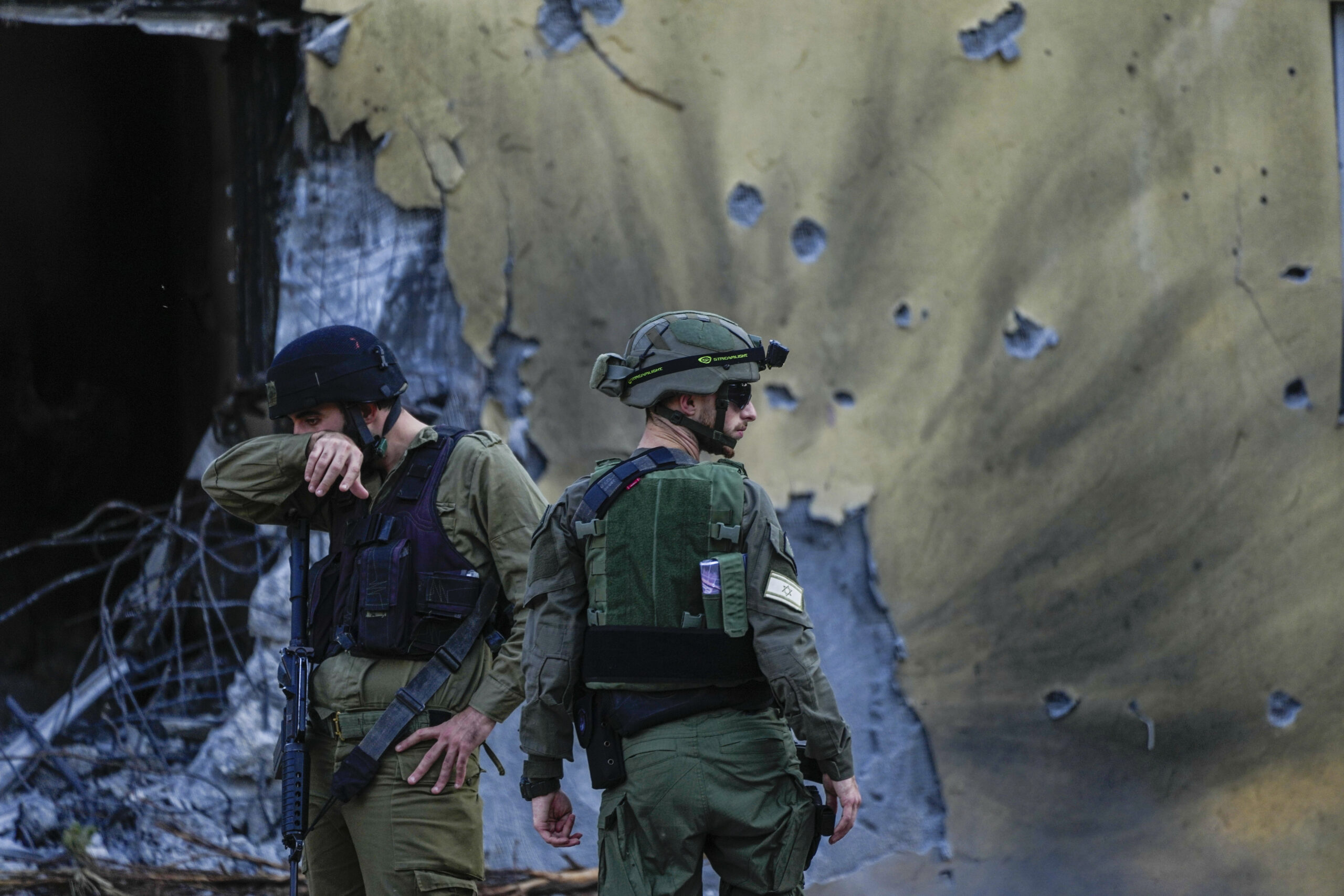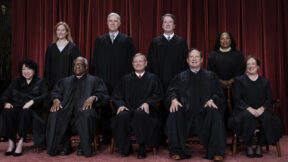
Israeli soldiers walk past houses destroyed by Hamas militants in Kibbutz Be’eri, Israel. AP Photo/Ariel Schalit.
Few words cause journalists such discombobulation as “terrorism” does, which the Hamas massacre of about 1,400 Israelis on Oct. 17 has laid bare once again. Calling a spade a spade, it seems, is too big a headache in such cases.
On that Saturday morning, many hundreds of the Hamas persuasion busted through the Gaza Strip’s border fence, using bulldozers and other means to shove the obstruction aside and charge into Israeli territory.
Aided by an incredible security breakdown, they were allowed for hours to rampage around communities near the border, where they shot and burned to death whole families in their homes, in some cases three generations captured together. They raped and tortured their victims (rescuers claim some heads were severed, some eyes removed from sockets), recording gleeful celebrations for posterity to behold.
Most of the victims were civilians, which seems a clinical way to refer to babies whose blackened, charred remains were left behind for scrap.
Among them was my former AP colleague Yaniv Zohar, 54, a videographer who covered southern Israel for the news agency. He was murdered in his home along with his wife Yasmin and two daughters. His 13-year-old son Ariel survived because he was out jogging when the attackers arrived and found refuge in another home.
I was Yaniv’s bureau chief in Israel, and later the regional Middle East editor based in Cairo. If I were still in such positions, I’d be arguing against but also policing AP’s refusal to refer to his murderers as terrorists committing terrorism – accepting it through gritted teeth but not without some understanding, because the arguments against calling a spade a spade are not entirely insane.
In AP’s compromise solution, Hamas’ butchers are “militants” or “fighters,” and what they did to Yaniv and other unarmed innocents was an “attack.” It’s hard to claim these terms are inaccurate; but they also seem inadequate to the purpose of constituting the rough draft of the history of this event.
The AP stylebook urges that “terrorist” and “terrorism” should only be used when attributed to authorities, and to instead describe specific actions being perpetrated. That does seem reasonable, because to call someone a terrorist can seem on one hand too general (why not say shooter?) and on the other too deterministic, seeming almost to imply a vocation (like a baker or a haberdasher).
To simply be specific also seems a practical path to avoiding the interminable debate over one person’s terrorist being another’s freedom fighter. Avoiding the term always is a safe way to sidestep the debate over where to apply it, including potential claims that Israeli counterstrikes against Hamas – or American ones against the Taliban – are “state terrorism” when civilians are harmed.
For AP and other cautious organizations, the exception, and this is a huge loophole, is when writing about historical events that are widely acknowledged as terrorist actions. This begs the question: Widely acknowledged by whom? It is a sticky wicket.
I remember how during the early 2000s, when covering the Second Palestinian Intifada, we wrestled with the question of whether suicide bombers blowing up innocents in Israeli pubs and on buses could be labelled terrorists.
Britannica defines terrorism as “the calculated use of violence to create a general climate of fear in a population and thereby to bring about a particular political objective.” This seemed to apply, but the instinct in the system was against it. “Suicide bombing” is more specific.
So it struck me that after 9/11, around the same time, there was little reluctance to refer to the perpetrators as terrorists – without any effort to establish distance by using quotes or invoking the amorphous mass known in journalese as “officials.”
You could argue that use of the word is to a degree – perhaps a great degree – just practical. That it is more likely to be used when there is a reasonable chance that the overwhelming majority of a readership – or in the agencies’ case, clientele – would not object. That’s less lofty that a zeal for specificity. But I assess it to be true.
That is why Reuters, which like AP has broad readership that encompasses every type of person on Earth, also tiptoes around the issue. Others, whose audience is identifiable politically, are less careful. Fox has no trouble calling a terrorist a terrorist, and interestingly, in the case of Hamas so does the New York Times. Harvard might learn from the Gray Lady.
So we must leave it to the skittish BBC to slip up and reveal the potential inconsistencies. Days after demurring on terrorism with the Hamas massacre, two football fans were shot dead in Belgium, leading to the BBC headline: “Brussels shooting: Suspects at large after two Swedes killed in terror attack.” It was corrected amid excuses and much awkwardness. But few readers were surprised.
The effort to always be neutral can seem wrong at times. In its caution to label leaders as “dictator,” the news media generally refers to both Vladimir Putin and Joe Biden as “president.” Is that not a false equivalence that risks trivializing, normalizing and ultimately serving the former’s despotism?
All this is easy to mock, but the media does deserve our sympathy. Ultimately I applaud highbrow journalists for at least thinking about such things, even if they they occasionally lower their guard, pander to the audience and let subjectivity rear its awkward head.
After all, the choice of vocabulary attaches not just to avoiding conflicts with readers but also to ethics we should applaud. When journalists apply value judgements in news coverage they can shape public perceptions cavalierly – and they can also make the audience cynical.
It is, realistically, a balancing act by imperfect human beings. And as often occurs, there is an official story and then there is the real world. In the real world, I think it’s more or less like this: If a murderous attack seems crazy and purely evil, we bite the bullet and call it terrorism; but if it attaches to some interminable tribal squabble, then however heinous it may be, we just don’t need the headache, and prefer to call it something else. To see a spade, and carefully just call it an implement.
Dan Perry was the top editor for the Associated Press in Europe, Africa and the Middle East, and the chairman of the Foreign Press Association in Israel and Palestine. He is the author of two books about Israel.
This is an opinion piece. The views expressed in this article are those of just the author.






